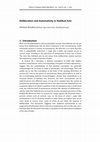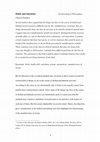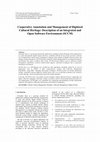Papers by Christos Douskos

Topoi, 2020
Given the pervasiveness of habit in human life, the distinctive problems posed by habitual acts f... more Given the pervasiveness of habit in human life, the distinctive problems posed by habitual acts for accounts of moral responsibility deserve more attention than they have hitherto received. But whereas it is hard to find a systematic treatment habitual acts within current accounts of moral responsibility, proponents of such accounts have turned their attention to a topic which, I suggest, is a closely related one: unwitting omissions. Habitual acts and unwitting omissions raise similar issues for a theory of responsibility because they likewise invite us to rethink the assumption that moral responsibility requires awareness of the relevant features of one’s conduct. And given the increasing interest in the problem of responsibility for unwitting omissions, it is reasonable to expect that the theoretical moves made in response to this problem might be used to make sense of judgments of responsibility regarding habitual acts. I substantiate these points by inquiring into whether some well-known accounts of unwitting omissions can be used to explain how we can be responsible for things we do out of habit.

European Journal of Philosophy, 2019
The domain of agential powers is marked by a contrast that does not arise in the case of disposit... more The domain of agential powers is marked by a contrast that does not arise in the case of dispositions of inanimate objects: the contrast between propensities or tendencies on the one hand, and capacities or abilities on the other. According to Ryle (1949), this contrast plays an important role in the 'logical geography' of the dispositional concepts used in the explanation and assessment of action. However, most subsequent philosophers use the terms of art 'power' or 'disposition' indiscriminately in formulating central metaphysical claims about human agency, assuming that an adequate account of inanimate dispositions can safely be used for such purposes. As a result, the distinctive features of propensities and capacities drop out of view. This is bound to obscure distinctions of crucial importance to the understanding of human agency. In order to show this, I undertake to articulate some central differences between propensities and capacities. Propensities and capacities have a different relation to value, as well as a concomitant difference in their metaphysical structure. The argument points to an explanation of why the distinction between propensities and capacities does not arise in the case of non-agential powers. This explanation takes us back to questions about the nature of human agency.
Synthese
The objective of this paper is to articulate a distinction between habit and bodily skill as diff... more The objective of this paper is to articulate a distinction between habit and bodily skill as different ways of acting without deliberation. I start by elaborating on a distinction between habit and skill as different kinds of dispositions. Then I argue that this distinction has direct implications for the varieties of automaticity exhibited in habitual and skilful bodily acts. The argument suggests that paying close attention to the metaphysics of agency can help to articulate more precisely questions regarding the varieties of automaticity exhibited in overt action.

Philosophical Papers
A central point of contention in the ongoing debate between Humean and anti-Humean accounts of mo... more A central point of contention in the ongoing debate between Humean and anti-Humean accounts of moral motivation concerns the theoretical credentials of the idea of mental states that are cognitive and motivational at the same time. Humeans claim that this idea is incoherent and thereby unintelligible (M. Smith, The Moral Problem, Blackwell 1994). I start by developing a linguistic argument against this claim. The semantics of certain 'learning to' and 'knowing to' ascriptions points to a dispositional state that has both motivational and cognitive properties: habitual knowledge, as we may call it. But there is nothing unintelligible or incoherent about such ascriptions as they figure in the explanation and assessment of action. This suggests that the idea of a state that has both cognitive and motivational properties is not an artefact of philosophical speculation. Moreover, I suggest that action explanations that appeal to habitual knowledge, which are a variety of habit explanation, present distinctive problems for Humean accounts. The discussion bears on the relationship between habitual knowledge and knowing-how, and its possible significance for anti-Humean accounts of moral motivation. [1] The idea that knowledge can be motivationally potent is central to both ancient and contemporary accounts of virtue, but has become a central point of contention in the debate on the nature of moral motivation. This is because this idea runs against the Humean claim that there is an exclusive distinction between cognitive and motivational states. Knowledge and belief, Humeans claim, fall squarely on the

Ethics in Progress, 2018
Most philosophers and psychologists assume that habitual acts do not ensue from deliberation, but... more Most philosophers and psychologists assume that habitual acts do not ensue from deliberation, but are direct responses to the circumstances: habit essentially involves a variety of automaticity. My objective in this paper is to show that this view is unduly restrictive. A habit can explain an act in various ways. Pointing to the operation of automaticity is only one of them. I draw attention to the fact that acquired automaticity is one outgrowth of habituation that is relevant to explanation, but not the only one. Habituation shapes our emotional and motivational make up in ways that affect deliberation itself. Hence mentioning a habit might be indispensable in explaining an act which nevertheless ensues from deliberation. The view that habitual acts are direct responses to the circumstances implies an impoverished conception of habit, which fails to do justice to its rich explanatory potential in theoretical and pre-theoretical contexts, as well as to its role in the history of philosophy.
International Journal of Philosophical Studies , 2017
Bill Pollard has recently developed an account of habits of action, endeavoring to rehabilitate t... more Bill Pollard has recently developed an account of habits of action, endeavoring to rehabilitate the traditional notion of habit in a way that can be used to address current philosophical concerns. I argue that Pollard's account has important shortcomings. The account is intended to apply indiscriminately to both habitual and skilled acts, but this overlooks crucial distinctions. Moreover, Pollard's account fails to do justice to the various ways in which the idea of habit figures in the explanation and assessment of action. These shortcomings are a consequence of certain assumptions Pollard shares with the accounts of mind and action he sets to criticize. As long as these assumptions are left intact, the potential of dispositional notions such as habit and skill to contribute to contemporary debates will not be realized.

Philosophia, 2017
Several authors have argued that the things one does in the course of skilled and habitual activi... more Several authors have argued that the things one does in the course of skilled and habitual activity present a difficult case for the ‘standard story’ of action: they are things intentionally done, but they do not seem to be suitably related to mental states. I suggest that once manifestations of habit are properly distinguished from exercises of bodily skills, we can see that habit raises a distinctive sort of problem. I examine certain responses that have been given, as well as responses that could be given on behalf of the standard story to the problems presented by manifestations of habit. These responses rely on the idea of a kind of intention that does not ensue from conscious thought or deliberation. I identify three different problems for this line of response. The conclusion is that habit explains aspects of human behavior that cannot be accounted by ascribing intentions of any kind.
Keywords: Habit; bodily skill; standard story of action; subsidiary actions; automaticity.

Grazer Philosophische Studien, 2017
The author raises objections to the intellectualist analysis of knowing-how on the basis of certa... more The author raises objections to the intellectualist analysis of knowing-how on the basis of certain features of ‘learning to’ ascriptions. He starts by observing that ‘learning to’ ascriptions can only have a first-personal reading. Since embedded questions make the generic reading available, this suggests that ‘learning to’ ascriptions are not embedded question configurations. Then the author locates an ambiguity in ‘learning to’ ascriptions. They can be used to ascribe either the acquisition of practical knowledge, or the acquisition of a behavioural disposition—a habit—of some value. Once this ambiguity is taken into account, it can be shown that the embedded infinitival in practical learning ascriptions cannot be negated, by contrast to embedded question configurations. This suggests that the semantic value of the infinitival is not propositional. Hence the intellectualist analysis fails to extend to learning ascriptions, and cannot accommodate the systematic relationships between knowledge and learning. The two points above regarding ‘learning to’ ascriptions extend to ascriptions of practical knowledge in certain languages.
Inquiry, 2013
In A Metaphysics for Freedom (Oxford: Oxford University Press, 2012), Helen Steward develops a d... more In A Metaphysics for Freedom (Oxford: Oxford University Press, 2012), Helen Steward develops a distinctive account of agency designed to support her argument for ‘Agency Incompatibilism’. I argue that Steward’s account of agency has two main shortcomings. First, the extension of the agency concept Steward is committed to is problematic. Second, Steward’s account of agency turns out on inspection to have significant structural affinities to the accounts it is meant to oppose, and thus faces similar potential problems. One of these problems has to do with Steward’s conception of bodily control.

Synthese, 2013
A central argument against Ryle’s (The concept of mind, University of Chicago Press, Chicago, 194... more A central argument against Ryle’s (The concept of mind, University of Chicago Press, Chicago, 1949) distinction between propositional and non propositional knowledge has relied on linguistic evidence. Stanley and Williamson (J Philos 98:411–444, 2001) have claimed that knowing-how ascriptions do not differ in any relevant syntactic or semantic respect from ascriptions of propositional knowledge, concluding thereby that knowing-how ascriptions attribute propositional knowledge, or a kind thereof. In this paper I examine the cross-linguistic basis of this argument. I focus on the linguistic analysis of practical knowledge ascriptions in Modern Greek, although the issues raised are not restricted to one language. It is relatively straightforward to show that none of the three types of practical knowledge ascriptions in Modern Greek is an embedded question configuration, and hence Stanley and Williamson original claim is confined to certain languages only. This is not the end of the matter, however, since Stanley (Nous 45:207–238, 2011) argues that the equivalents of ‘knowing-how’ ascriptions in certain languages should be semantically analyzed as embedded questions despite their syntactic form. I argue that this fallback position faces a host of empirical and theoretical problems, in view of which it cannot bear the weight Stanley puts on it, supporting a conclusion about the kind of knowledge thereby attributed.
Review of Bioethics 2/3 (forthcoming)

Nowadays there is a growing potential for applications enabling Cultural Heritage (CH) organizati... more Nowadays there is a growing potential for applications enabling Cultural Heritage (CH) organizations to create and annotate digital content. However, available solutions do not always provide a coherent set of comprehensive and accurate techniques to organize large volumes of digital cultural content, and manage related annotations. SCCM (Systema Cultural Content Management) is an integrated software environment that seeks to address these needs. SCCM provides features such as advanced content management capabilities, extensive media format support, watermark techniques and a cooperative annotation environment. SCCM relies on a Web-Based n-tier architecture that implements standards related to its area of application, such as CIDOC. It offers comprehensive Content and Collection Management Capabilities, using XML-Metadata description techniques. SCCM provides rich media information storage, annotation between different cultural assets and a set of task-based interfaces for extensive...
The work proposed in this paper is part of the development of an integrated environment for the e... more The work proposed in this paper is part of the development of an integrated environment for the exhibition of digitised museum artefacts. This environment will enable the realistic representation of the virtualised ( i e . digitised 3-D surrogates of physical objects) exhibits and the Museum's interiors. The system is currently under development and will enable geographically dispersed users to visit this virtual museum at anv time inside a shared digital environment where they can meet, associate and interact with each other and the exhibits over the World Wide Web. The system will be the basis of an integrated learning environment and this system aspect is also investigated. Other services like general info and guidance for the visitors will also be implemented. This work is currently fimded by the project "ANASTILOSIS" [ l ] of the Greek Ministry for Development.
Book Reviews by Christos Douskos
European Journal of Philosophy, 2020











Uploads
Papers by Christos Douskos
Keywords: Habit; bodily skill; standard story of action; subsidiary actions; automaticity.
Book Reviews by Christos Douskos
Keywords: Habit; bodily skill; standard story of action; subsidiary actions; automaticity.